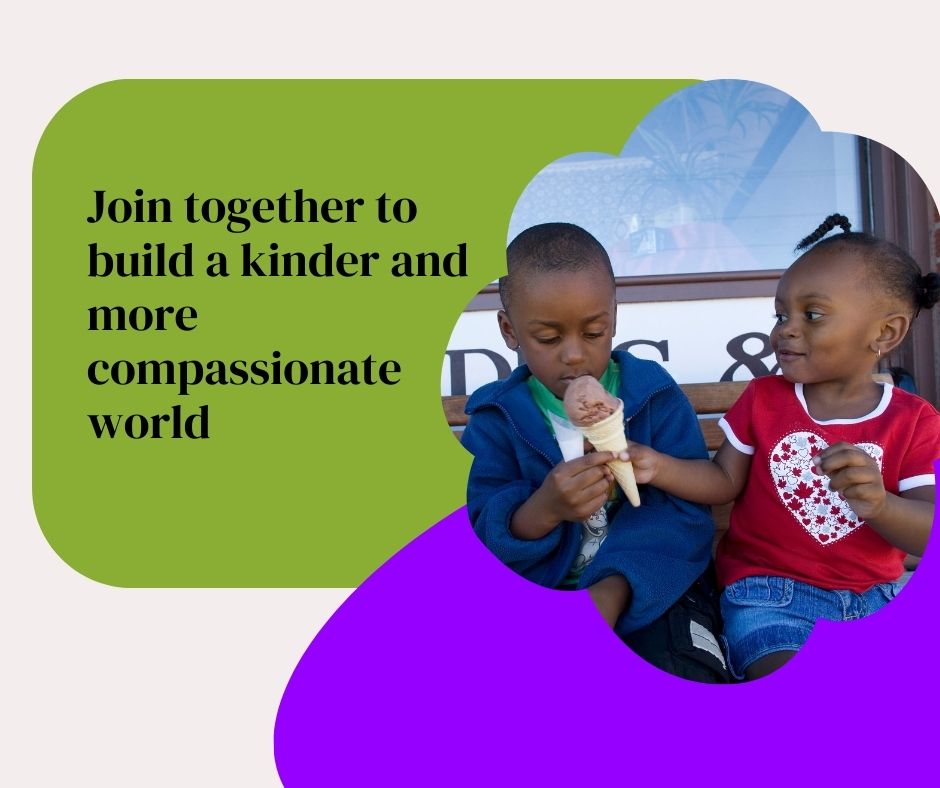Raising Kind Kids: World Kindness Week!

November 16th
2023

Kindness isn’t just a world; it’s a movement. Did you know that November 13th -19th is World Kindness Week? People from all across the globe will recognize its importance and encourage charitable efforts for others at a moment in our history when we all could use more positivity and altruism. At KohParenting, we’d like to take this opportunity to discuss how we can cultivate kindness in our own families and teach the value to our children. Let’s keep this culture of kindness going now and for future generations! Read on for all the details.
The Gist
World Kindness Week is an international event every November to celebrate kindness and promote acts of compassion and generosity toward others.
Scientific evidence suggests that kindness serves an evolutionary purpose and benefits health. Humans are wired to care for each other and connect to survive. Kindness emits chemicals and neurotransmitters that promote physical, emotional, and mental well-being.
Kindness can be powerful in co-parenting because it inspires parenting partners to treat each other and their children respectfully. Treating each other kindly can heal lingering feelings from the separation or divorce and shift mindsets from negative to positive.
You can teach your children to be kind by modeling kindness toward themselves and others, building their empathy and understanding of different emotions and perspectives, and involving them in acts of kindness and charity.
The Power of Kindness:

World Kindness Day was established in 1998 as an international holiday to celebrate and promote kindness. The idea emerged from a conference in Tokyo in which representatives from all across the globe discussed the topic and pledged “to join together to build a kinder and more compassionate world” (Source). People typically honored the occasion by reflecting on the power of kindness and engaging in random good deeds. Over time, this annual one-day event gained momentum and was extended to a week. Every community continues to put its spin on it and conduct various fun-filled activities with the same essential mission to educate the public and encourage us to treat each other with empathy and generosity.
Kindness sounds nice; the dictionary defines the word as something positive (i.e., the quality of being friendly, generous, and considerate) but doesn’t explain the “how” or the “why.” In truth, kindness is much more than pleasant “fluff;” it’s a scientific phenomenon with proven benefits to physical, mental, and emotional health.
According to an article from Psychology Today, Charles Darwin, infamous naturalist, geologist, and biologist, pointed out that kindness has evolutionary value for our species and has thus become written into our DNA to help us survive and thrive. Humans instinctively care for each other, very much so as adult caregivers but even as early as toddlerhood. Various research studies have found that kindness positively impacts health, whether you’re the one being kind or being treated kindly by others.
The “secret sauce” of kindness is chemical. Positive, intimate interactions with others release the hormone “oxytocin,” which makes us feel good and helps us to form social connections. Some studies also show that acts of kindness increase the neurotransmitters dopamine (which evokes euphoric feelings of accomplishment) and serotonin (which regulates mood).
In sum, so much evidence supports the value of kindness that it’s no wonder an entire week-long holiday was founded in its honor! But what does all this mean for co-parents? Read on to explore all that kindness can do for your co-parenting.
Kindness and Co-Parenting:
Co-parenting well requires lots of kindness. You and your parenting partner must put aside your differences to work together peacefully and respectfully. You’ll likely have times when you disagree, and in those moments,, you can call upon the kindness within your heart to empathize with each other’s perspectives and find common ground. Your children, meanwhile, will need your patience and compassion as they process the whole gamut of emotions in response to your separation/divorce and all the changes it brings to their lives.
Kindness can also serve as a healing salve for your family. At times, you may carry resentment or anger about the end of your romantic relationship, which is valid and normal. But releasing those feelings onto your ex, children, or other people won’t likely give you the closure you seek. On the other hand, being kind can shift your state of mind from frustration to forgiveness and make it easier for you to be the respectful co-parent your family needs. The effect can be reciprocal; your kindness can make your ex feel more forgiving and compassionate toward you and encourage them to treat you better moving forward.

Raising Kind Kids:
A parent’s ultimate goal is to raise healthy children who find happiness by contributing positively to the world. Recognizing World Kindness Week is one step toward achieving this, but it can’t be the only one. Sustainable kindness is a lifestyle, not one particular event, and to reap its benefits, we need to practice it daily. Here are some suggestions for ways you can foster kindness in your family.
- Treat yourself with kindness! Being gentle with yourself isn’t selfish or weak. Your own tank must be full for you to give to others, so pour in positive thoughts and energy. Be mindful of the thoughts running through your mind, and do your best to avoid being overly judgmental or critical of yourself. Engage in self-care whenever possible, and surround yourself with people who build you up.
- Be kind, friendly, and helpful to others. Smile, say hello to passersby when appropriate, use words like “please” and “thank you,” and do little everyday kind things for others (like holding doors, asking someone who fell if she’s okay, bringing meals to a sick neighbor, etc.). Check your words and posture toward others when your kids are within earshot. Your actions and words must align for your kids to process them fully and learn from them. Your child may adopt an unkind, pessimistic mindset if you frequently speak ill of others or complain about them.
- Treat your children with respect. Sometimes, we do things to our children that we would never do to anyone else. For example, we might enforce the idea that it’s unacceptable to yell at others by scolding them loudly. Or we might chastise them for not listening but neglect to look up from our phones when they’ve been calling to get our attention. Kids are just as worthy of respect as adults, and if they don’t get it, how can we expect them to extend it to others? Our previous post Kids Are People Too: How Co-Parents Can Use a Respectful Approach to Nurture Their Child's Development spells this out in greater detail.
- Treat your co-parent with respect. This might be hard at times, but the rewards are great. Keep your interactions respectful and positive in your child’s presence. When issues arise, do your best to utilize conflict resolution strategies rather than yelling or arguing.
- Build empathy by embracing all feelings. Resist the urge to “correct” or override your child’s emotions and instead validate them. Talk about their feelings and help them to explore other people’s feelings as well. You can do this by reading books, playing games like “how would you feel if…,” or simply having feelings check-ins.
- Make “kindness” a family motto. You want your children to make positive choices, not because they’re afraid of punishment or looking to get something out of it but simply because their conscience tells them to! You can teach them this by prioritizing compassion and kindness and promoting your family’s values as a way of life (i.e., a “motto) rather than a “rule” or “chore.” For example, your family motto could be “In the Jones’ family, we look out for one another and treat people how we want to be treated.”
- Reinforce kind acts by giving them the recognition they deserve. Acknowledge when you, your parenting partner, your child, or someone else does something kind by referring to it as such. Incorporate regular gratitude practice into your day-to-day life. This can be especially powerful for co-parenting families when parenting partners express thankfulness toward each other or recognize each other’s positive qualities. For ideas, check out our previous post, Tis the Season for Thankfulness.
- Involve your child in acts of altruism. There are many ways to be kind; even very young children can participate in most of them. Find volunteer opportunities you can do together. Involve your child in projects such as food drives, rounding up toy and clothing donations from your home, etc.
- Create kindness “challenges.” Find ways to make kindness playful and fun! You could create a kindness tree, for example, and place a leaf on the tree for every kind act. Or make a kindness jar, fill it with a token every time you witness something kind, and celebrate when it is full. Children and adults alike can be motivated by concrete, measurable goals.
Building a Kinder Future:
Amongst all the uglier aspects of life- divorce, illness, death, violence, war, prejudice, hate- we all come back to one beautiful thing: kindness. It’s the thread that unifies all of us, an unbreakable bond that can withstand any hardship. We hope this post has armed you with ample evidence and ideas for exercising the power of kindness. What do you do in your family to promote kindness? Let us know! Your acts of compassion toward yourself, your child, and others may be little pebbles in a stream, but they’ll create ripple effects that can flow into the future for generations to come.


In the upcoming week...
Thanksgiving is right around the corner, and many consider it the beginning of the holiday season. This time of year brings both joy and challenges, and KohParenting will be here to help you through it all. Next week, we’ll be talking about how single-parent families can cope with the stress of the holidays. Don’t miss it!

Loading
Thank you for joining our
Koh-Parenting Community!
We are registering your email address. Please don't leave this page. You will be redirected in less than 10 seconds.
To continue reading this blog, join our community!
When you join our community you will keep you in the loop on the latest co-parenting topics, our weekly Newsletter, company updates and happenings. We will be here every step of the way as you embark on a developing a healthier co-parenting relationship.
Latest Posts

We’ve Just Separated; Now What?” Series, Part II: Defining the New Relationship
What happens to the dynamic between two people when a relationship ends? After a breakup, many people completely remove [...]

We’ve Just Separated; Now What?” Series, Part I: What is Co-Parenting?
Are you stepping into 2024 as a newly minted co-parent? You’re not alone: statistically, the first Monday after New Ye[...]

Giving Back to YOU: Why Celebrating Your Co-Parenting Wins is the Ultimate Gift to Yourself
When was the last time you celebrated yourself? Many people spend the last few weeks of the year running around, buying [...]

KohParenting’s Top 3 Holiday Spending Pitfalls, Solved!
The ads are everywhere: ‘tis the season for spending! Retailers big and small all jump on the bandwagon at holiday tim[...]

7 Ways Single Parents Can Manage Holiday Stress
Any parent knows that the holidays can be full of both magic and mayhem. For single-parent families, the period from Tha[...]

Celebrate With Us: A Year of the Best in Koh-Parenting Content
Co-parenting is one of the most challenging roles anyone could possibly undertake, and it’s important to celebrate all[...]
